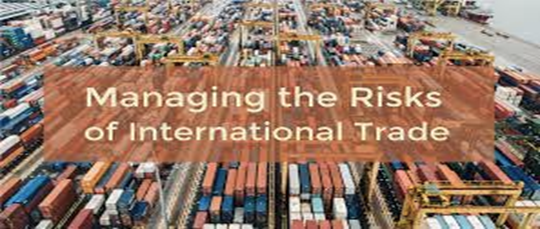Engaging in international trade offers businesses lucrative opportunities for growth and expansion. However, it also exposes them to risks that can significantly impact their operations and bottom line. From geopolitical uncertainties to currency fluctuations and regulatory complexities, navigating the world of international trade requires a proactive approach to risk management.
This blog post delves into the key strategies for mitigating risks associated with international trade.
Understanding the Risks Involved in International Trade

Before exploring strategies for mitigating risks associated with international trade, it is essential to understand those risks. The most common types of risk in trade finance in a global setup are as follows:
- Political Risk: Political instability or government policy changes can significantly impact international trade. For example, if a country imposes tariffs or embargoes on imports from another country, this could substantially disrupt existing trading relationships and cause financial losses in trade finance.
- Currency Risk: Exchange rate fluctuations can majorly impact profits and losses when engaging in international trade. If one currency appreciates against another, goods purchased using that currency may become more expensive than expected when sold abroad. Conversely, if one currency depreciates against another, goods purchased using that money may become cheaper than expected when sold abroad.
- Regulatory Risk: Different countries have different regulations governing how businesses operate within their borders, which can change over time without warning. Companies engaging in international trade must be aware of relevant laws and always comply.
- Logistical Risk: Delays or disruptions during transportation can lead to delivery delays, resulting in financial losses due to missed deadlines or lost sales opportunities due to late deliveries. Additionally, goods may be damaged during transit, leading to financial losses and reputational damage.
Strategies for Mitigating Risks Associated With International Trade
Once the various types of risk associated with international trade have been identified, companies should take steps to mitigate them as much as possible by implementing the following strategies:

- Diversification of Suppliers & Markets:
By diversifying suppliers and markets, companies can reduce their exposure to political risk by ensuring they only rely heavily on a single supplier or need, which could be affected by sudden changes such as tariffs or embargoes imposed by governments without warning. Additionally, diversifying suppliers and markets allows companies access between multiple currencies, which reduces their exposure to exchange rate fluctuations between different currencies since profits/losses from additional trades will offset each other, somewhat reducing overall volatility caused by exchange rate fluctuations between foreign money used for trading purposes.
- Monitor Regulations & Policies Regularly:
Companies should monitor relevant regulations regularly to be aware of any changes affecting their operations before they occur. This allows the companies the time to prepare accordingly rather than being caught off guard by sudden changes. Additionally, monitoring policies related to import/export restrictions, taxes, etc., help ensure compliance at all times, avoiding potential fines/penalties.
- Use Insurance:
Insurance provides protection against unexpected events such as delays/disruptions during transportation, damage to goods during transit, etc. This helps protect against financial losses due to missed deadlines/lost sales opportunities resulting from late deliveries/damaged goods received from overseas suppliers.
- Establish Contingency Plans:
Establishing contingency plans helps prepare companies for unexpected events, such as political instability leading to sudden changes in government policies affecting existing trading relationships. Exchange rate fluctuations cause unexpected gains/losses due to changing prices between two currencies used for trading. Having contingency plans ready allows companies to respond quickly, minimising disruption.
International trade carries certain risks. However, these can be mitigated through careful planning and implementation of appropriate strategies. The strategies include diversifying suppliers & markets, monitoring regulations & policies regularly, using insurance where necessary, and establishing contingency plans for responding quickly to unexpected events. By taking these steps, companies can reduce their exposure to various risks associated with international trade while maintaining profitability despite adverse conditions.


buy amiodarone without prescription dilantin 100mg over the counter dilantin 100mg canada
buy irbesartan 150mg for sale buspar 10mg without prescription buy cheap generic buspar
dark web site darknet market links
darknet seiten tor marketplace
deep web markets tor darknet
deep web sites best darknet markets
buy amiodarone 200mg without prescription purchase phenytoin sale dilantin pill
irbesartan canada avapro online order order generic buspar
order cordarone 200mg sale amiodarone 200mg pills phenytoin order
cheap amiodarone 100mg order coreg 25mg pill order dilantin 100 mg online cheap
avapro tablet avapro pill order buspar generic
darkmarket darknet search engine
darknet websites dark web websites
amiodarone 100mg sale oral dilantin phenytoin pill
cordarone 100mg drug amiodarone over the counter phenytoin 100mg sale
dark market onion tor markets links
oral avapro 150mg buy buspar 5mg for sale order buspar 10mg without prescription
Great information shared.. really enjoyed reading this post thank you author for sharing this post .. appreciated
Crypto Pokies Australia Real Money Real Quiet Fortunes Built